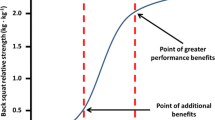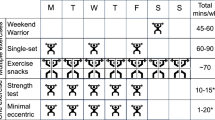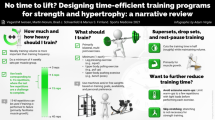Abstract
Objectives
Creatine and protein supplementation can enhance the training outcomes of young subjects, but it is not clear if there are benefits for older individuals. Therefore, the purpose of this study was to determine the effects of creatine and protein supplementation on strength gains following a traditional resistance training program for middle-aged and older men.
Design, Setting, Participants
This study assessed changes in strength of men aged 48–72 years following 14 weeks of resistance training supplemented with creatine and/or protein. A double-blind, randomized, placebo-controlled design placed 42 males into one of four groups: Resistance Trained Placebo (RTP, n=10); Resistance Trained Creatine (RTCr, 5g Cr, n=10); Resistance Trained Protein (RTPr, 35g whey Pr, n=11); or Resistance Trained Creatine and Protein (RTCrPr, 5g Cr and 35g Pr, n=11).
Intervention
All groups trained 3 days per week for 14 weeks. The resistance training program was based on progressive overload. Training loads corresponded to 80% 1RM (one repetition maximum strength), 3 sets of 8 repetitions for the following exercises: knee extension/knee flexion; bicep curl/tricep extension; military press; lat pull down; seated leg press; and bench press.
Measurements
1 RM for each exercise and measures of lean body mass were assessed prior to and following the 14 week program.
Results
Each group significantly (p<0.05) increased strength and lean body mass, however, there were no significant group effects or group X trial interactions.
Conclusion
Resistance training in middle-aged and older men significantly increased muscular strength and added muscle mass with no additional benefits from creatine and/or protein supplementation.
Similar content being viewed by others
References
Roubenoff R, Hughes V. Sarcopenia: Current Concepts. J Gerontol Medical Series A 2000: 55A: M716–M724.
Hunter G, McCarthy J, Bamman M. Effects of resistance training on older adults. Sports. Med 2004: 34(5): 329–348.
Burke D, Chilibeck P, Davison K, Candow D, Farthing J, Smith-Palmer T. The effect of whey protein supplementation with and without creatine monohydrate combined with resistance training on lean tissue mass and muscle strength. Int J Sport Nutr Exerc Metab 2001: 11: 349–364.
Campbell W, Crim M, Dallal G, Young V, Evans W. Increased protein requirements in the elderly; New data and retrospective reassessments. Am J Clin Nutr 1994: 60:501–509.
Campbell W, Crim M, Young V, Joseph J, Evans W. Effects of resistance training and dietary protein intake on protein metabolism in older adults. Am J Physiol 1995: 268: E1143–E1153.
Hartman J, Tang J, Wilkinson S, Tarnopolsky M, Lawrence R, Fullerton A, Phillips S. Consumption of fat-free fluid milk after resistance exercise promotes greater lean mass accretion than does consumption of soy or carbohydrate in young, novice, male weightlifters. Am J Clin Nutr 2007: 86(2): 373–381.
Kerksick C, Rasmussen C, Lancaster S, Magu B, Smith P, Melton C, Greenwood M, Almada A, Earnest C, Kreider R. The effects of protein and amino acid supplementation on performance and training adaptations during ten weeks of resistance training. J Strength Cond Res 2006: 20(3): 643–653.
Lemon P, Tarnopolsky M, Macdougall J, Atkinson S. Protein requirements and muscle mass/strength changes during intensive training in novice bodybuilders. J Appl Physiol 1992: 73:767–775.
Schulte J, Yarasheski K. Effects of resistance training on the rate of muscle protein synthesis in frail elderly people. Int J Sport Nutr Exerc Metab 2001: 11: S111–S118.
Short K, Nair K. Muscle protein metabolism and the sarcopenia of aging. Int J Sport Nutr Exerc Metab 2001: 11: S119–S127.
Tarnopolsky M, Parise G, Yardley N, Ballantyne C, Olatunji S, Phillips S. Creatine-dextrose and protein-dextrose induce similar strength gains during training. Med Sci Sports Exerc 2001: 33(12): 2044–2052.
Rawson, E, Wehnert M, Clarkson P. Effects of 30 days of creatine ingestion in older men. Eur J Appl Physiol 1999: 80: 139–144.
Smith S, Montain S, Matott R, Zientara G, Jolesz F, Fielding, R. Creatine supplementation and age influence muscle metabolism during exercise. J Appl Physiol 1998: 85: 1349–1356.
Greenhaff P. The nutritional biochemistry of creatine. J Nutr Biochem, 11: 1997: 610–618.
Brose A, Parise G, Tarnopolsky M. Creatine supplementation enhances isometric strength and body composition improvements following strength exercise training in older adults. J Gerontol, Series A 2003: 58: B11–B19.
Cribb P, Williams A, Stathis C, Carey M, Hayes A. Effects of whey isolate, creatine, and resistance training on muscle hypertrophy. Med Sci Sports Exerc 2007:39(2): 298–307.
Olsen S, Aagaard P, Kadi F, Tufekovic G, Verney J, Olesen J, Suetta C, Kjaer M. Creatine supplementation augments the increase in satellite cell myonuclei number in human skeletal muscle induced by strength training. J Physiol 2006: 573(2): 525–534.
Cohen J. Statistical Power Analysis for the Behavioral Sciences, 2nd edition. 1988 Lawrence Erlbaum Associates, Hillsdale NJ.
Eliot K, Knehans A, Bemben D, Witten M, Carter J, Bemben M. The effects of creatine and whey protein supplementation on body composition in men aged 48 to 72 years during resistance training. J Nutr Health Aging 2008: 12(3): 208–212.
Wilder N, Deiuert R, Hagerman F. The effects of low dose creatine supplementation versus creatine loading in collegiate football players. J Athl Train 2001: 36(2):124–129.
Wilder N, Gilders R, Haterman F. The effects of a 10 week, periodized, off-season resistance-training program and creatine supplementation among college football players. J Health res 2002:16(3): 343–352.
Bemben M, Bemben D, Loftiss D. Creatine supplementation during resistance training in college football athletes. Med Sci Sports Exerc 2001: 33(10): 1667–1673.
Becque M, Lochmann J, Melrose D. Effects of oral creatine supplementation on muscular strength and body composition. Med Sci Sports Exerc 2000:32: 654–658.
Stevenson S, Dudley G. Creatine loading, resistance exercise performance, and muscle mechanics. J Strength Cond Res 2002: 15(4): 413–419.
Esmarck B, Anderson J, Olsen S, Richter E, Mizuno M, Kiaer M. Timing of post exercise protein intake is important for muscle hypertrophy with resistance training in elderly humans. Am J Physiol 2001: 535(1): 301–311.
American College of Sports Medicine Position Stand — Progression models in resistance training for healthy adults. Med Sci Sports Exerc 2009: 41(3): 687–708.
Candow D, Little J, Chilibeck P, Abeysekara S, Zello G, Kazachkov M, Cornish S, Yu P. Low-dose creatine combined with protein during resistance training in older men. Med Sci Sports Exerc 2008: 40(9): 1645–1652.
Earnest C, Snell P, Mitchell T, Rodriguez R, Almada A. Effect of creatine monohydrate ingestion on peak anaerobic power, capacity, and fatigue index. Med Sci Sports Exerc, 1994: 26: S39.
Kreider R, Ferreira M, Wilson M, Grindstaff P, Plisk S, Reinardy J, Cantler E, Almada A. Effects of creatine supplementation on body composition, strength, and sprint performance. Med Sci. Sports Exerc 1998: 30: 73–82.
Volek J, Kraemer W, Bush J, Boetes M, Incledon T, Clark K, Lynch J. Creatine supplementation enhances muscular performance during high-intensity resistance exercise. J Am Diet Assoc 1997: 97: 765–770.
Volek J, Duncan N, Mazzetti S, Staron R, Putukian M, Gomez A, Pearson D, Fink W, Kraemer W. Performance and muscle fiber adaptations to creatine supplementation and heavy resistance training. Med Sci Sports Exerc 1999: 31: 1147–1156.
Syrotuik D, Bell G. Acute creatine monohydrate supplementation: A descriptive physiological profile of responders vs. nonresponders. J Strength Cond Res 2004: 18(3): 610–617.
Bermon S, Venembre P, Sachet C, Valour S, Dolisi C. Effects of creatine monohydrate ingestion in sedentary and weight-trained older adults. Acta Physiol Scand 1998: 164: 147–155.
Eijnde B, Leemputte M, Goris M, Labarque V, Taes Y, Verbessem P, Vanhees L, Ramaekers M, Eynde B, Van Schuylengergh R, Dom R, Richter E, Hespel P. Effects of creatine supplementation and exercise training on fitness in men 55–75 yr old. J Appl Physiol 2003: 95: 818–828.
Ahmun R, Tong R, Grimshaw P. The effects of acute creatine supplementation on multiple sprint cycling and running performance in rugby players. J Strength Cond Res 2005: 19(1): 92–97.
Hoffman J, Stout J, Falco M, Kang J, Ratamess N. Effect of low-dose, shortduration creatine supplementation on anaerobic exercise performance. J Strength Cond Res 2005: 19(2): 260–264.
Deldicque L, Louis M, Theisen D, Nielens H, Dehoux M, Thissen J-P, Rennie M, Francaux M. Increased IGF mRNA in human skeletal muscle after creatine supplementation. Med Sci Sports Exerc 2005: 37(5): 731–736.
Dorofeyeva E, Dorofeyev A. Biochemical and heart adaptations to physical training and supplementation with amino acids. J Strength Cond Res 2004: 18(4): 738–740.
Theodrou A, Havenetidis K, Zanker C, O’Hara J, King R, Hood C, Paradisis G, Cooke C. Effects of acute creatine loading with or without carbohydrate on repeated bouts of maximal swimming in high-performance swimmers. J Strength Cond Res 2005: 19(2): 265–269.
Bemben M, Lamont H. Creatine supplementation and exercise performance: Recent findings. Sports Med 2005: 35(2): 107–125.
Author information
Authors and Affiliations
Corresponding author
Rights and permissions
About this article
Cite this article
Bemben, M., Witten, M., Carter, J. et al. The effects of supplementation with creatine and protein on muscle strength following a traditional resistance training program in middle-aged and older men. J Nutr Health Aging 14, 155–159 (2010). https://doi.org/10.1007/s12603-009-0124-8
Received:
Accepted:
Published:
Issue Date:
DOI: https://doi.org/10.1007/s12603-009-0124-8




